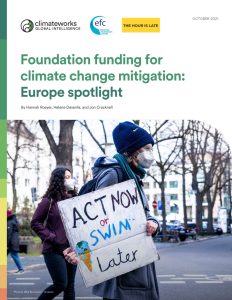Dear funders, we have two questions for you.
First, do you get out of bed in the morning thinking about issues like human rights, gender, migration, public health, inequality, peace and security, education, democracy, poverty alleviation, international development, or the wellbeing of future generations?
Second, is your foundation making grants on climate change, or is it signed up to one of the growing number of Philanthropy Commitments on Climate?
If your answer to the first question was yes, and your answer to the second question was no, then your help is needed. Now.
Climate change is with us already, with July 2021 confirmed as the world’s hottest month ever, and extreme weather events causing devastating and widespread impacts across Europe and around the world, from unprecedented wildfires to torrential rain and flooding. We also see millions of young people calling for climate justice around the world, 80 per cent public support for ambitious climate action in some countries, and institutions representing more than one-third of the world’s assets under management committing to net-zero emissions targets.
 However, our new report from ClimateWorks Foundation, the European Foundation Centre, and The Hour Is Late shows that climate change mitigation grants still represent less than 2 per cent of total European foundation giving. It is hard to avoid the feeling that the continent’s foundation sector as a whole is missing in action.
However, our new report from ClimateWorks Foundation, the European Foundation Centre, and The Hour Is Late shows that climate change mitigation grants still represent less than 2 per cent of total European foundation giving. It is hard to avoid the feeling that the continent’s foundation sector as a whole is missing in action.
Philanthropy has a unique and critical role to play in supporting climate change mitigation by increasing global ambition, supporting innovative solutions, and scaling proven mitigation strategies. Philanthropy can take risks that the public and private sectors can’t or won’t take. It can support frontline advocacy, emerging but unproven breakthrough technologies, and unique collaborations that bring together voices from the public, private, and civil society sectors.
Our new report draws on 6,230 grants worth €1.8 billion from 136 foundations across 2016, 2018, and 2020. While nearly €2 billion may sound like a lot, the total needs to be understood relative to the much larger sums being spent by those trying to slow down decarbonization of the economy and the levels of investment needed to effectively mitigate climate change, not to mention the 98 per cent of European foundation funding going to other issues.
There is some good news. Funding supporting climate change mitigation initiatives in Europe tripled between 2016 and 2018, and funding going from Europe to initiatives in the rest of the world more than tripled. We applaud the substantial new funding commitments made by some of the largest philanthropic foundations in the world and the leadership shown by the growing network of advisors, pooled funds, and others engaged on climate. This is an exciting moment to be tackling this existential crisis, and we see more and more well-known foundations taking up the challenge, but we need to do much more, and quickly.
One way to get started is to examine where current foundation funding is already flowing. As our report shows, grants for climate change mitigation within Europe are heavily concentrated in just 10 countries, all but one in Western Europe, and many of which are already among the world’s best performers when it comes to climate policy. This raises the question of whether this is an optimal allocation of scarce philanthropic capital, given that each unit of greenhouse gases emitted has the same impact on climate change, irrespective of where it originates geographically.
It’s also informative to examine the sectors of the economy that are receiving funding, in order to identify gaps and opportunities. We show, for example, that grants focused on transforming transportation account for just 4 per cent of giving focused on Europe, despite transportation being a sector of the economy in which European greenhouse gas emissions are rising quickly. And we demonstrate that grants to support ‘grassroots and movement-building’ amount to less than 1 per cent of total giving in Europe, and just 1.2 per cent of the grants from European foundations to the rest of the world. The report highlights both countries and approaches that are starved of resources, where donors with diverse experiences and budgets can immediately make an impact.
Runaway climate change will make it extremely hard for foundations to achieve their philanthropic goals. Every moment of delay increases the risk that we will render the planet uninhabitable. Conversely, funding for climate solutions now can yield enormous returns in preventing unnecessary harm, particularly for the world’s most vulnerable communities.
There are plenty of people who can provide advice on how to get started, and lots of opportunities to learn from more experienced donors. With just nine years to halve current greenhouse gas emissions and achieve the goals of the Paris Agreement, we can’t afford to reinvent the wheel, and to waste valuable philanthropic capital on fragmented and short-term interventions. With climate change, as Bill McKibben reminds us, ‘winning slowly is the same as losing.’
Jon Cracknell is the founder and director of The Hour Is Late, working with a range of foundations. Hannah Roeyer is a freelance consultant supporting data-driven strategy for foundations and other social good organizations. Helene Desanlis is Associate Director for Global Intelligence at ClimateWorks Foundation.








Comments (0)